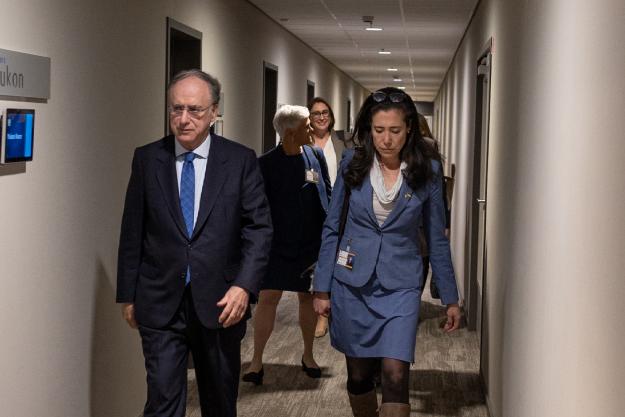
Ambassador Fernando Arias, Director-General of the OPCW, meets with Ms Mallory Stewart, Assistant Secretary of State for Arms Control, Verification and Compliance of the United States of America, and their respective delegations.
THE HAGUE, Netherlands—29 November 2023—The Director-General of the Organisation for the Prohibition of Chemical Weapons (OPCW), Ambassador Fernando Arias, had a meeting with the United States’ Assistant Secretary of State for Bureau of Arms Control, Deterrence and Stability, Ms Mallory Stewart, on 27 November 2023 on the sidelines of the Twenty-Eighth Session of the Conference of the States Parties to the Chemical Weapons Convention (CSP-28) in The Hague, Netherlands.
During the meeting, Ambassador Arias and Assistant Secretary Stewart discussed a wide range of issues related to the implementation of the Chemical Weapons Convention (CWC) in the current international security climate. The Director-General underscored that preventing the re-emergence of chemical weapons is a top priority for the OPCW in the post-destruction phase. In this regard, he emphasised that it is essential to monitor advances in science and technology that could have a significant impact on chemical disarmament and non-proliferation, and that the OPCW Centre for Chemistry and Technology (ChemTech Centre) is an important tool for the Organisation to keep pace with these developments. The Director-General also underlined that an increasing number of capacity building activities are being delivered through the Centre to strengthen chemical safety and security in Member States.
“I would like to thank the United States for its strong political and financial support to build and operationalise the ChemTech Centre. The United States’ generous contribution to the Centre’s innovative capacity building and training projects will help the Organisation to strengthen its international cooperation programmes and enhance Member States’ capabilities to conduct chemical research and analysis,” said the Director-General.
Ambassador Arias underlined that the end of destruction of all declared chemical weapons stockpiles on 7 July 2023 was an important achievement for the Organisations and its Member States. He also emphasised that reaching this significant milestone was a critical step in the Organisation’s endeavour to permanently eliminate chemical weapons and ensure that chemistry is used only for peaceful purposes.
Ambassador Arias also gave updates on the OPCW’s work in the Syrian Arab Republic and thanked Assistant Secretary Stewart for the U.S. voluntary contribution to the OPCW Trust Fund for Syria Missions: “The U.S. contribution to the OPCW Trust Fund for Syria Missions will support the Organisation in its work on the Syrian chemical weapons dossier and in upholding the norms and principles of the Chemical Weapons Convention.”
The Director-General also underscored that achieving universality of the Convention is of critical importance for the Organisation and briefed Ms Stweart on the recently issued joint communiqué between the Republic of South Sudan and the OPCW. He highlighted that only by achieving the full universality of the Convention can the world be assured all chemical arsenals have been declared and destroyed.
“The United States remains committed to strengthening the OPCW and to providing it with the resources it needs to address the continued threat of chemical weapons use. This includes our recent and upcoming U.S. contributions to the OPCW capacity building and training efforts at the ChemTech Center, the Trust Fund for Syria missions, and the Junior Professional Officer program,” said Assistant Secretary Stewart.
Background
The United States has been an active member of the OPCW since the Chemical Weapons Convention entered into force in 1997. The U.S. is a member of the Executive Council, the OPCW’s executive organ, which is responsible for promoting the effective implementation of and compliance with the Chemical Weapons Convention as well as supervising the activities of the Organisation’s Technical Secretariat.
The U.S. has provided approximately €6.5 million in voluntary contributions to the Trust Fund for the OPCW Centre for Chemistry and Technology, an important upgrade to the OPCW’s research, analytical and capacity building activities. The Centre serves as a knowledge repository to address chemical threats worldwide, and as a platform for the broader OPCW community to promote expert dialogue, exchange, and collaboration in advancing the peaceful and safe uses of chemistry.
The new facility also helps strengthen Member States’ capabilities related to verification tools, detection and response in the case of a chemical emergency.
The Declaration Assessment Team was established in 2014 to engage the relevant Syrian authorities to resolve the identified gaps, inconsistencies, and discrepancies in the Syrian declaration. The Fact-Finding Mission was set up in the same year in response to persistent allegations of chemical weapon attacks in Syria, with the task to establish facts surrounding allegations of the use of toxic chemicals for hostile purposes. The Investigation and Identification Team began its work in 2019 and is responsible for identifying the perpetrators of the use of chemical weapons in Syria.
As the implementing body for the Chemical Weapons Convention, the OPCW, with its 193 Member States, oversees the global endeavour to permanently eliminate chemical weapons. Since the Convention’s entry into force in 1997, it is the most successful disarmament treaty eliminating an entire class of weapons of mass destruction.
On 7 July 2023, the OPCW verified that all chemical weapons stockpiles declared by the 193 States Parties to the Chemical Weapons Convention since 1997 — totalling 72,304 metric tonnes of chemical agents — have been irreversibly destroyed under the OPCW’s strict verification regime.
For its extensive efforts in eliminating chemical weapons, the OPCW received the 2013 Nobel Peace Prize.
